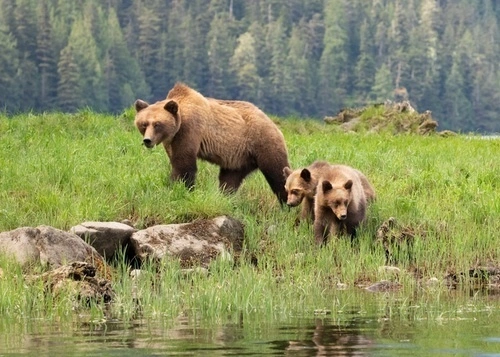
Earlier this month, the U.S. Court of Appeals for the Ninth Circuit issued a ruling holding that the United States Fish and Wildlife Service’s (Service) decision not to modify a recovery plan for the grizzly bear (ursus arctos horrbilis) was not a final agency action subject to review under the Administrative Procedure Act (APA).
In 1975, the Service listed the grizzly bear as a threatened species under the Endangered Species Act (ESA). At the time of listing, the grizzly bear’s population in the contiguous United States fell to between 700-800 individuals. Pursuant to its statutory obligation for threatened species, the Service issued a Grizzly Bear Recovery Plan (Recovery Plan) that identified actionable recovery goals and designated specific recovery zones for the bear. The original Recovery Plan was approved in 1982, revised in 1993, and has undergone plan supplements in the years since. At present, the Service states there are at least 1,923 grizzly bears in the contiguous United States. Nonetheless, the bear’s current range across five northern states remains limited compared to its prior population range across eighteen western states.
Seeking to further the grizzly bear’s geographic recovery, in 2014 the Center for Biological Diversity (CBD) filed a petition with the Service to revise and expand the Recovery Plan to “ensure the full recovery of the species across its native range in the United States.” The Service denied CBD’s petition, and stated that the 1993 Recovery Plan was still in compliance with the statutory requirements and additional recovery planning was not mandatory, but subject to the Service’s discretion. In response, CBD filed an action seeking judicial review under the APA and ESA to compel the Service’s revision. After the district court granted summary judgment to the Service, CBD appealed the district’s ruling as to the APA claim; CBD did not appeal the district court’s ruling on the ESA claim.
The Ninth Circuit’s analysis focused on whether the Service’s decision was a final action under the APA, and therefore subject to review. The court reiterated the two-pronged standard that an agency action is only final if it (1) marks the consummation of the agency’s decision-making process and (2) rights or obligations have been determined, or it is a determination from which legal consequences will flow. While the Recovery Plan did fit under the APA’s broad definition of a rule, the court determined that the Service’s discretionary decision not to amend the Recovery Plan was not a final agency action subject to judicial review.
The Ninth Circuit found that even if the Recovery Plan marked the consummation of the Service’s decision-making process under the first prong, recovery plans issued for listed species do not impose obligations or confer rights upon anyone. Although the Service is required to create a recovery plan for threatened species like the grizzly bear, the recovery plan is not what determines whether the bear will remain listed and does not impose legal obligations on the Service. Thus, the second prong could not be met.
Because CBD’s lawsuit did not challenge a final agency action, the Ninth Circuit held that it could not review the action under the APA and thus affirmed the district court’s grant of summary judgment for the Service.
- Associate
Noah DeWitt assists clients on a full range of environmental and land use law matters. Noah has experience conducting legal research and drafting memorandum regarding issues related to CEQA development compliance, local zoning ...
Nossaman’s Endangered Species Law & Policy blog focuses on news, events, and policies affecting endangered species issues in California and throughout the United States. Topics include listing and critical habitat decisions, conservation and recovery planning, inter-agency consultation, and related developments in law, policy, and science. We also inform readers about regulatory and legislative developments, as well as key court decisions.
Stay Connected
 RSS Feed
RSS Feed
Categories
- Alternative Energy
- Bald and Golden Eagle Protection Act
- Budget
- CEQA
- CESA
- Climate Change
- Congress
- Conservation
- Construction Projects
- Consultation
- Continuing Education
- Court Decisions
- Critical Habitat
- Delisting
- Endangered Species Act
- Event
- Fish & Wildlife Service
- Freedom of Information Act
- Government Administration
- Legal
- Legislation
- Listing
- Litigation
- Migratory Bird
- National Marine Fisheries Service
- NEPA
- Off Shore Wind
- Pacific Northwest
- project
- Publications
- Regulatory Reform
- Sacramento-San Joaquin Delta
- SEPA
- Speaking Engagements
- Supreme Court
- Texas
- Timberland
- Water Issues

